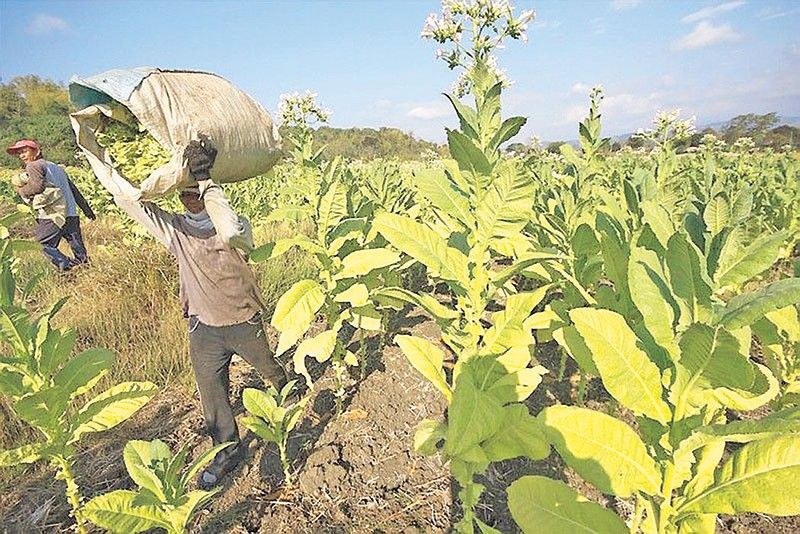Tobacco farmers pin hopes on 60-year-old idle fund

(First of a series)
MANILA, Philippines — Tobacco farming might well be Bernard Vicente’s second name. Vicente, now 50, knows it like the back of his hand. He has been cultivating the crop for three decades and counting.
The chairman of the National Federation of Tobacco Farmers’ Associations and Cooperatives, Vicente has been the face of the struggles of tobacco farmers for better welfare.
As a long-time farmer-leader, he has been a staunch advocate of the rights and well-being of tobacco farmers nationwide.
He has been through multiple tax law battles, input cost spikes, debates on the existence and contributions of the tobacco industry, among others.
But this time, the third-generation tobacco farmer from Sinait, Ilocos Sur finds himself supporting a push to unlock a fund that has been idle for decades but is seen as a potential catalyst for the development of the Philippine tobacco industry.
That fund – the Tobacco Fund – turned 60 this year. It was created under Republic Act 4155, which was signed on June 20, 1964. As the name itself states, it is an earmarked fund from the tobacco industry, and for the tobacco industry.
At first, it was composed of half of the total tariffs or taxes collected on imported leaf tobacco as well as half of the special taxes on locally manufactured Virginia-type cigarettes.
Four years after RA 4155, Republic Act 5447 was enacted into law, resulting in the adjustment of the earmarking of collections for the Tobacco Fund.
Since then, the Tobacco Fund represents the 40 percent of the balance of the entire collection from specific taxes on locally manufactured Virginia-type cigarettes and tariff duties on imported leaf tobacco after setting aside the share of local government units and the Bureau of Internal Revenue.
Buried in the past
Industry sources told The STAR that the Tobacco Fund almost became a distant memory if not for a fortuitous event some 20 years ago.
Government officials belonging to the National Tobacco Administration (NTA), the government agency tasked to develop the industry and improve the lives of tobacco farmers, chanced upon the existence of the fund in 2004.
That year, the agency was in a “precarious” financial situation, said Nestor Casela, a long-time NTA official and a former deputy administrator. So precarious, Casela explained, that the agency did not have sufficient budget to even pay the salaries of its employees.
The NTA headed by then administrator and CEO Carlito Encarnacion formed a group, which Casela was part of, to identify financial sources to salvage the agency’s life.
This led to the discovery of RA 4155, giving the agency a glimmer of hope. And so, on June 13, 2006, the Department of Budget and Management (DBM) created a special account in the general fund to park the entitlement of NTA under RA 4155.
Under existing laws, the Tobacco Fund must be used to wipe out the debts and bankroll the continued operations of one of the predecessors of the NTA, the Philippine Virginia Tobacco Administration, which included support for farmers.
The special account for the Tobacco Fund had an initial deposit of some P575 million from the DBM. But it would be four more years later before the NTA would get a substantial portion of the budget, receiving P409 million in 2010. The allocation was used by the agency to improve farmers’ tobacco quality and provide additional livelihood to boost their income.
An arduous journey
The NTA has been prodding the DBM to release to the agency a portion of the Tobacco Fund.
From 2010 until 2024, roughly P6.6 billion has been released from the Tobacco Fund to the NTA. That amount, however, is just six percent of the remaining P107 billion accumulated under the 60-year-old fund.
The amount is so huge it can provide financial assistance to all rice farmers tilling two hectares and below for at least nine straight years.
It is also 1,000 times higher than the cash incentives that two-time Olympic gold medalist Carlos Yulo received. And it is also comparable to the long-idled Coconut Levy Fund.
During the Duterte administration, the NTA became more aggressive and optimistic in accessing higher allocation from the Tobacco Fund to bankroll a medium-term industry roadmap that it created to modernize the industry.
But even the presence of such a comprehensive plan called STEP or the Sustainable Tobacco Enhancement Program was not enough for the NTA to get substantial funding out of the parked budget in the national coffers.
The STEP is a five-year roadmap that seeks to modernize the tobacco industry through various programs from block farming to productivity enhancement measures that would provide tobacco farmers with continuous income in the long run without being dependent on the crop.
The NTA, however, is not giving up on its goal of getting a substantial allocation under the Tobacco Fund. The agency updated its previous roadmap to address the needs of the farmers amid worsening threats like climate crisis as well as to increase its chances of getting the nod of budget officials to bankroll its projects.
From STEP, the agency is now calling its industry blueprint as STEP-UP, a nod to elevating the welfare of the tobacco farmers.
“We can do a lot more. We can do more programs for our stakeholders if we are given enough (funding) to implement projects which we deem necessary for the upliftment of the living conditions, economic conditions of our tobacco farmers and of course, to alleviate poverty,” said Casela, who has returned from retirement and is currently, the NTA’s deputy administrator.
(To be continued)
- Latest
- Trending




























